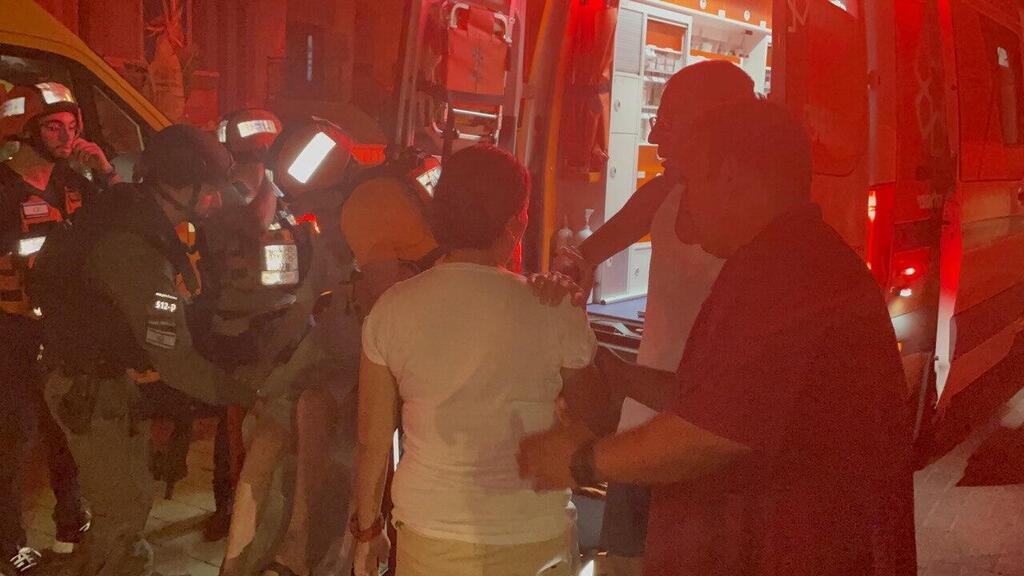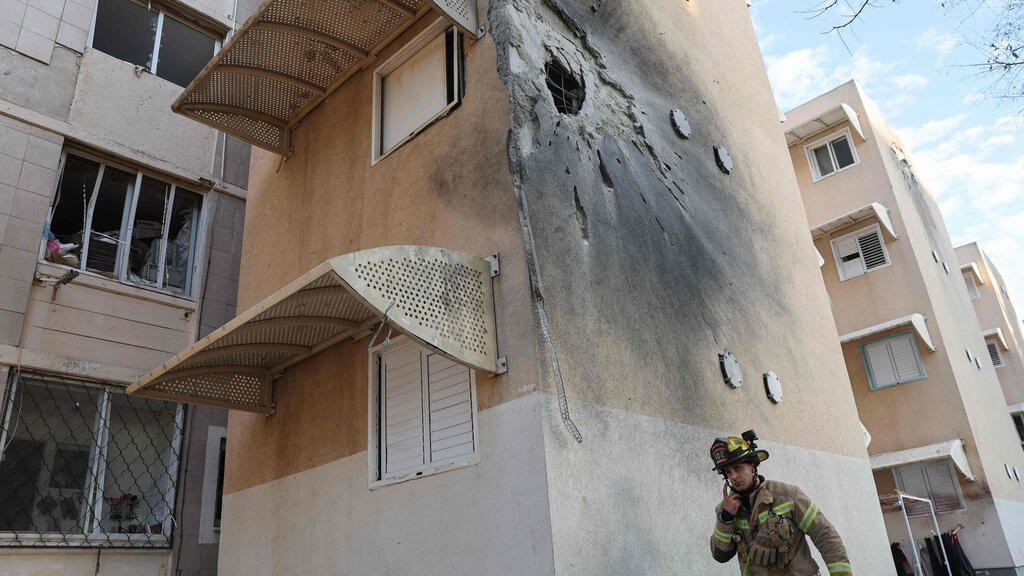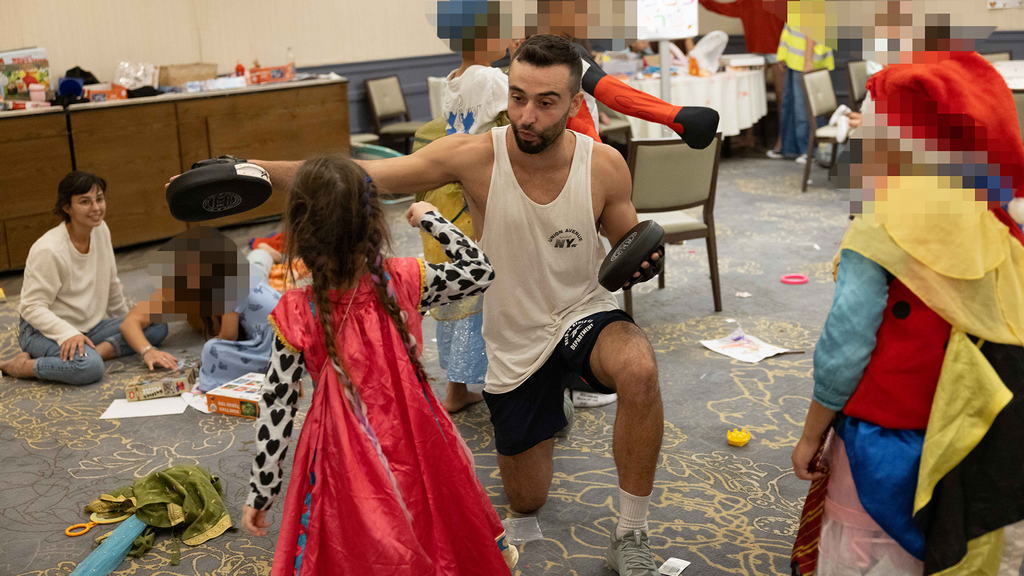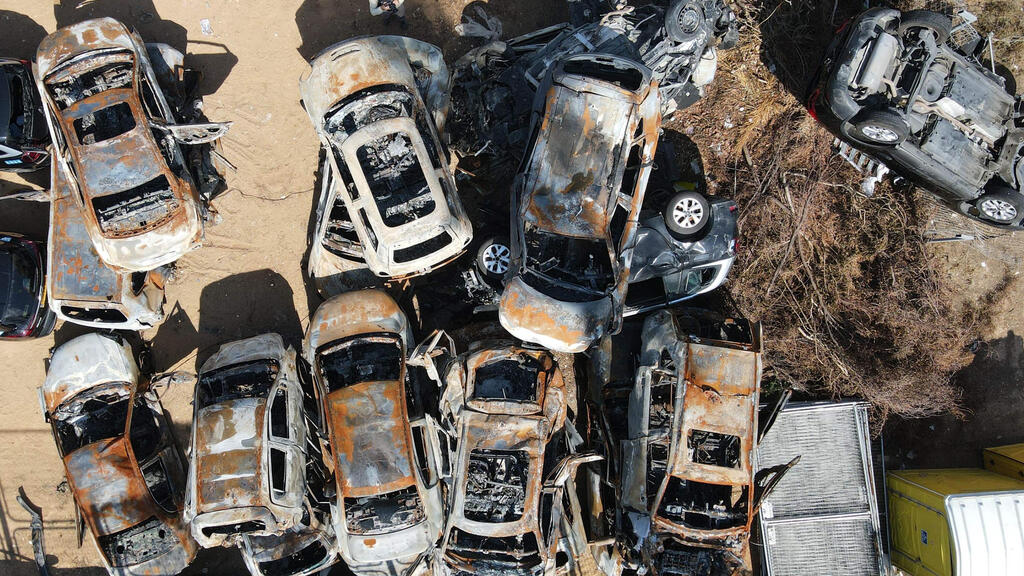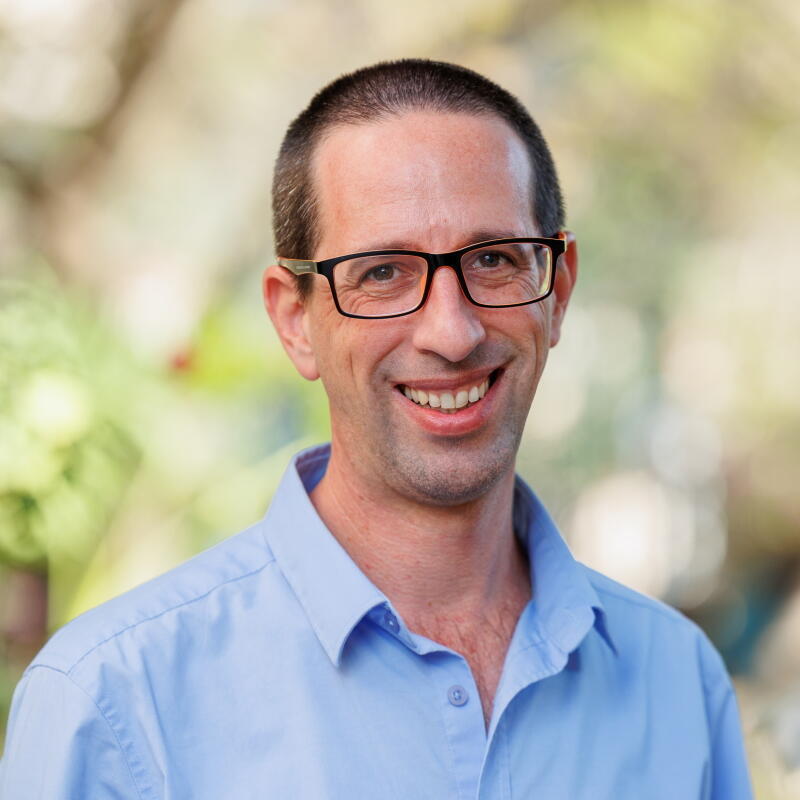This is the Israeli Broadcast Station Reshet Bet. Monday, the third day of the war. The IDF spokesman announces that all Israeli communities near the Gaza Strip are now under IDF control. The Prime Minister, Benjamin Netanyahu, said that “Gaza will become a city of ruins” and that the Israeli government will see to it that Hamas rule in the Gaza Strip will be overthrown. The number of victims of the attack by Hamas has risen to 1,000, with an estimate of 150 hostages. Defense Minister Yoav Gallant said…
I turn off the radio. My heart is very heavy. I've been feeling it physically for three days now, sitting in my chest. Are internal organs supposed to feel like this? The phone is ringing. It’s Yair. Usually, a phone call at noon means, "Are you free for beers tonight?" But who can sit down for a drink today?
Read more:
“What's going on, Yair?”
“Okay, you know.”
6 View gallery
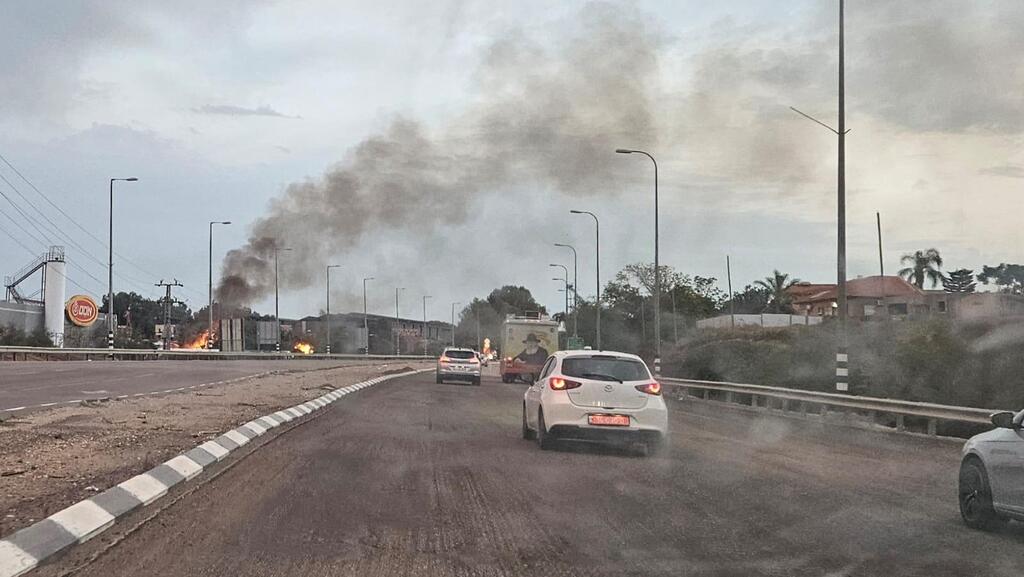

The view from the car window as Yoav Friedman and his friend Yair enter Sderot
(Photo: Yoav Friedman)
“Yes, me too. I'm trying to eat, I have no appetite.”
“Listen, there are a lot of sandwiches made by friends in our community, and I want to drive them to the soldiers in the south, but I don't want to go alone. Do you want to come?”
I love Yair. But to the South? How far south? I hope he hasn’t gotten into his head to go all the way to the military camps around the Strip. I don’t think I can run fast, not with my heart and all.
“Where were you thinking of going?”
“I heard there are reservists near Beit Kama.”
Ok, not as bad as I feared.
“Okay, I'm coming.”
“Sababa, will you be ready in another fifteen minutes? I'll pick you up. We also have a reserve soldier who needs a ride, so we'll make a little detour to pick him up.”
The right lane of Route 6 is loaded with military trucks carrying tanks and equipment. Traffic is slow, and the driver of the car in the next lane is looking at us and at our passenger. He gestures to us to open a window.
“Where are you guys enlisting?”
“Us? It's just him.” I say back, “We're already old.”
“Well, you look young.” A small ray of light in all this darkness?
At the entrance to the base stands a reservist with curls on his head and stubble on his cheeks.
“Hey, do you want a sandwich? We have a lot.”
“Sure.”
“One second, we'll park on the side.”
He enters the base for a moment, calling out: “Guys, we need some people to help, who's coming?” In the meantime, we take out bags and bags of sandwiches, each wrapped with notes: meat; dairy; good luck; take care of yourself; gluten-free; pastrami; pesto; come back in peace; vegetarian; cheese; we love you; we will win.
“Thanks, that's enough for us,” says the one with the curls. He is holding four bags in his hand.
"But we still have a lot left, maybe 150, don't you want them?”
“No, no, we're not that many here,” answers another reservist, holding another five or six bags. “Go on with it. But thank you very much, alufim, champions.”
We are not champions. You are. Yair closes the trunk.
“So where do we go next? We have a lot more sandwiches to hand out. It would be a shame to let them go to waste.”
He opens WhatsApp, and a message pops up from the “Gaza Envelope Evacuation Drivers” group. This is a new group, just started this morning, maybe the 10th new group Yair has joined since the war started. The entire home front has become a network of WhatsApp groups buzzing non-stop. Everyone is helping everyone all the time.
“A driver is needed to evacuate two people from Sderot,” the message reads. Yair looks at me and asks, “You want to go?”
Well, no, not really. Sderot is scary. When a siren goes off, you have only 15 seconds to get to shelter, and we're in the car, no concrete ceiling above us. Two terrorists were found and killed in Sderot just yesterday. What rational person would want to go? And what about the sandwiches? Isn't it a shame to let them waste? Are there barriers at the entrance to Sderot?
"Let's call to find out more details," Yair says. The guy wants to help. A good guy – no wonder I love him so. But cool. He’s too cool. We call on speaker, and I talk: "Hi, my name is Yoav, I'm here with my friend, we understand that two people need evacuation."
“Yes, you can get there?”
“We think so, but do you know if it's even possible to get there? Are there any barriers?”
“I... don't know for sure.”
“And do we need a weapon?”
“I don't know that either, sorry. I'm just a civilian, coordinating all kinds of requests that are coming in. Do you want to take 20 minutes to check whatever you want and get back to me?"
I look at Yair, who nods. "Yes, yes, already."
Another message pops up on the mobile, a push notification from Ynet. Hundreds of residents of the South were evacuated to a base half an hour from where we are. Maybe they would like the sandwiches? It's in the opposite direction from Sderot, so we have to choose.
"Which do you prefer?" Yair asks. I want to say sandwiches, but I'm a bit uncomfortable, in the end there are people in the line of fire waiting to be evacuated. In my heavy heart, I know that that’s probably more important right now. “Which do you prefer?” I repeat the question, “Do you think it's safe?”
After 20 minutes, we call back.
“Well, we’re going to Sderot,” I hear myself say, “where does this couple need to go?”
“Netanya.”
“Netanya?! We are not going there, but we can get them half way. Would that help?”
“Oh, no, they're an old couple, they can’t walk around on the roads looking for another ride.”
Nice, I think to myself for a split second.
“But I also have Boris who wants to evacuate to Ashdod, would that suit you?"
Oh, there’s Boris.
"Ah, well, yes, Ashdod sounds good."
“Great, you guys are awesome!”
We are off to Sderot. Waze says 20 minutes.
I feel my heart start to speed up. Yair, God bless him, doesn’t seem afraid. We don’t hear any missiles or alerts, but a cloud of smoke in the distance doesn’t exactly say “welcome.” The roads are empty, and those who are driving, drive fast. Yair says, call again, since we’re already going there, we have a big car, maybe we can take other people too. More people? What is this guy thinking? But I call.
“Ah... hey, yes, it's us again. We're in the car on the way to Sderot, listen, our car is big, maybe there's someone else we can pick up, since we’ll already be there?”
“Look, there’s someone who needs to get to Karkur, but she uses an oxygen tank.”
"Oh, we're not heading toward Karkur.”
I am relieved. But Yair signals me with his hand, and I surrender.
“Oh... maybe we can bring her closer to the center of country, and she can continue from there?”
“I don't think so. She asked for evacuation with oxygen.”
“What does evacuation with oxygen mean?”
“I don't know, ask her daughter.” She gives me the phone number as we arrive in Sderot.
At the intersection marking the entrance to the city there are only two types of cars: those with sirens and lights on their roofs, and transit vans with speakers on their roofs blaring Breslover music on full blast. On the left, a factory is on fire. Nobody seems to care. It’s like an apocalyptic movie set, only real.
Waze guides us to the address where we will pick up Boris, and in the meantime I talk to Alina, the daughter of Masha, who needs to get to Karkur.
“Karkur is far, we can’t get there, but is there maybe another place we can move her to?”
“She's connected to an oxygen tank, and we really have to move her. Can you bring her to Ashkelon instead?”
“We'll take her. What's your location? We’re using Waze.”
“No, no, Waze is no good. It won't lead you to the right place, I'll guide you.”
I am stressed from being in this city.
Boris’s house is in a small business square surrounded by residential buildings. Burned cars are littered on the sides of the roads. A reporter for Kan, an Israeli television station, wearing a protective vest and helmet, is talking to a camera. But Boris is not ready yet. He’s taking his time. My heart, on the other hand, is in a hurry.
If there is a siren now, where will we run? Fifteen seconds to take cover. I consider the rows of metal shopping carts under the concrete roof of the supermarket. Maybe I could fit in between two of them? Where the hell is Boris? I call him again and see a man approaching with two bags stop to answer the phone.
“Hey Boris, we’re here, come on.”
He arrives and apologizes, "The elevator doesn't work, and I was delayed on the stairs. Do you want bananas? I bought some a few days ago and I don’t want them to rot at home, maybe you want some?"
“Sure, sure, bananas. Later. Now come, get in the car, we have another pick up." I enter the address Alina gave me into Waze and call her.
“We're on our way. Where exactly are we going?”
There is no one on the streets. Ghost town. On our way, we see a car abandoned on the median, waiting for quieter days.
Waze leads us toward the address Alina gave us, and then she gives us the final steps: continue straight, then left. Stop in front of the playground. We are in the parking lot of an old apartment building. The glass of the front doors is shattered, and the atmosphere is depressing. The sun is starting to set.
We go up one floor and knock on Masha’s door.
“Who is this?”
“Ummm… we’ve came to pick you up.”
“What's your name?”
“Yoav.”
“Where are you taking me to?”
“Ashkelon.”
“Okay, I'm opening”
I hear the key turning in the keyhole, and the door opens. In front of us stands an elderly woman with her husband beside her, holding a flashlight. The house is completely dark.
“I'm sorry for asking you all these questions. These days you never know.”
“It's perfectly fine, completely understandable.” Behind her, walking with very heavy steps, is another elderly woman, with a tube in her nose connected to a heavy metal oxygen tank.
“All the electricity went out,” says the woman who opened the door, “and her oxygen generator isn’t working. We have to get her out of here, because the oxygen in the tank is running out and she doesn’t have another one.”
“We'll take her right away.”
“Thank you very much, you are doing a great mitzvah. This is her equipment."
She points to a pile of objects, and then to the electric oxygen generator. We hurry to transfer the equipment to the car, and Masha starts to go down the stairs slowly. Very slowly. Fifteen seconds… what if there is a siren now? What will we do?
Leaving the building, moving slowly to the car. The couple who opened the door for us supports Masha and I walk behind them, holding the oxygen tank. Yair starts the car. There is no use staying here even a second longer than necessary. Masha sits in the front and we drive. From now on, every kilometer we travel north means a few more seconds of safety after a siren goes off. Not that Ashkelon is easy. Over there it is 30 seconds to shelter, but quite a few missiles have fallen there. At least it’s on the way home.
Masha says something in Russian, and taps on the window. Yair opens it, and she says “thank you” in Hebrew. Then she says something in Russian, and Yair looks at me in the mirror: he doesn’t understand. Boris translates, "She said she needed air."
Time flies, and it's already dark. On the way north, the names on the signs are familiar only from reports about alarms and missiles, and from the horrible headlines of the last few days: Ibim; Or HaNer; Bror Hayil. Ambulances and cars with lights and sirens pass us.
A quarter of an hour passes, and Masha again asks us something in Russian, and again Boris helps, “How long will it take us?”
“Ten minutes, tell her, really close.”
We enter Ashkelon. It’s mostly dark, but at least it looks like a city. This is not the village of Sderot. We hear noise from under the wheels; the road is full of broken glass. Please let us not get a flat tire!
We arrive at a street with high-rise buildings, Alina and other family members are already waiting for us downstairs, thanking us non-stop. We unload the equipment, we are happy to help. Really happy to help.
Masha again insists on addressing us in Russian and this time Alina translates.
“She says she wants to pay you.”
“No, no!”
“She insists.”
“No, absolutely not. It's our pleasure.”
“She says she won’t leave the car if you don't take money.”
Yair and I look at each other. Sometimes, taking is also a kindness.
"Todah," she says again, and she gets out of the car.
We say goodbye to the Ashkelon family and continue to Ashdod. Forty-five seconds to shelter. On the way, we talk politics with Boris. We don't agree on anything, and it’s obvious no one is going to change their opinion, but it's a good way to pass the time. We arrive at the designated address. Boris also insists on paying, and we already know that there is no point in resisting.
“Take care of yourself, and let’s hope for good news,” we call to him.
Yair puts the car in reverse.
“This money will pay for the beers we will need to relax from this trip,” Yair says. "It’s going to weigh on me for a while longer.”
“Definitely,” I agree. "Might even require whiskey."
Suddenly Boris turns back and runs towards the car. Yair stops and opens the window with a questioning look. Boris pushes in a bag.
“I can't believe it, I almost forgot the bananas.”
--
The story is true, but the names of the residents of Sderot have been changed to protect their privacy. The sandwiches came home with us, and we passed them along to another friend. I’m not sure who ate them. The actions I’ve described here are a fraction of a fraction of the extensive and pulsating activities of Israeli society at this time. Am Yisrael Chai.
Yoav Friedman is director of Communications, Marketing and Content at the Shalom Hartman Institute. Translated by Devora Busheri.



